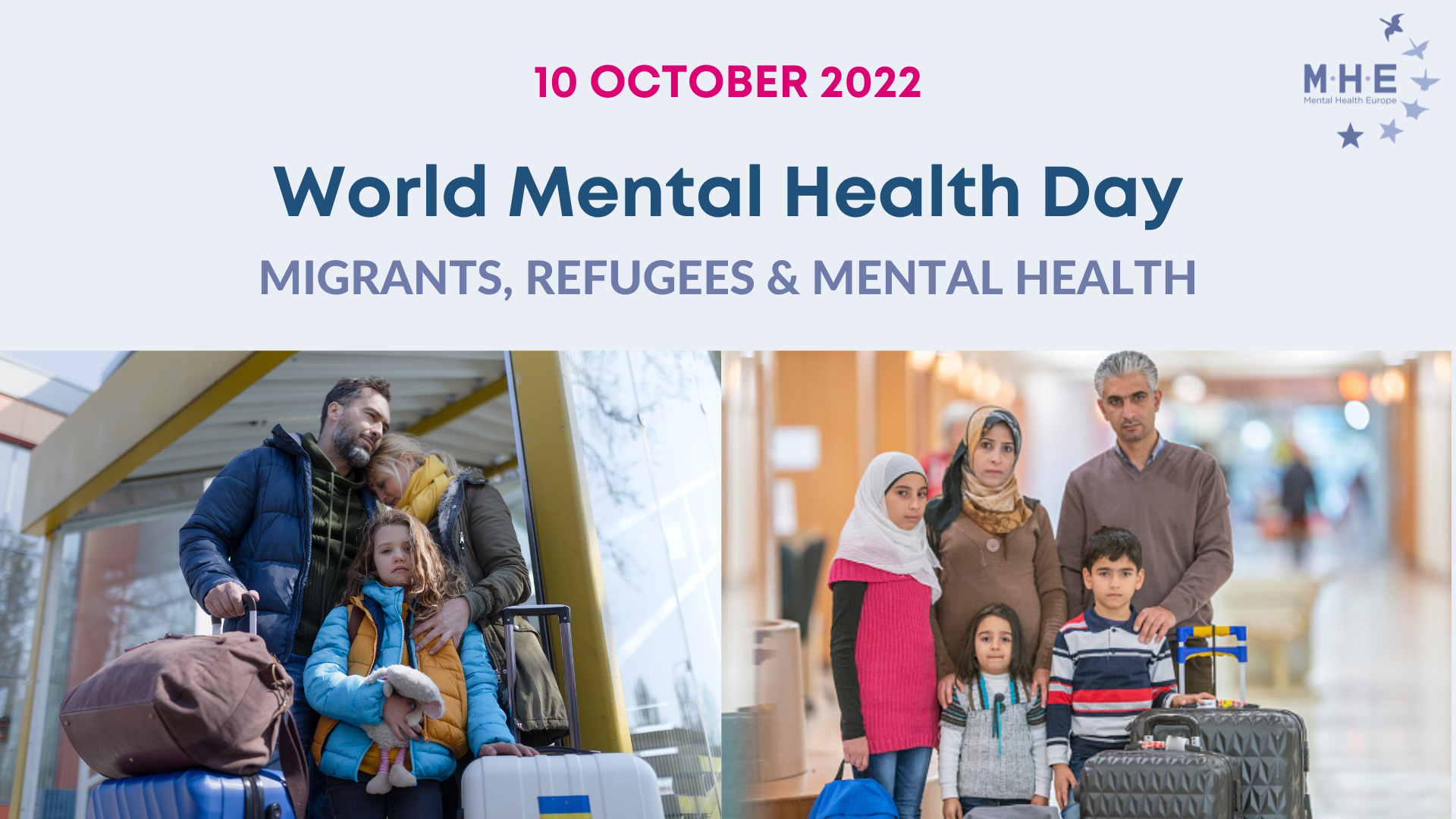Press Release: World Mental Health Day 2022

On the occasion of World Mental Health Day, Mental Health Europe (MHE) calls for stronger, more inclusive, accessible mental health promotion, prevention, and services for refugees and migrants at a European Parliament event co-hosted by MEP Tilly Metz (Greens/EFA) and MEP Estrella Durá Ferrandis (S&D).
Migration, including for those seeking asylum, concerns almost every country in the world. Europe is experiencing the largest movement of people since WWII with 6.6 million reported to have fled Ukraine besides refugees from other countries (e.g. Syria, Yemen, Afghanistan, etc.) entering Europe. This is putting a spotlight on the short, medium, and long-term mental health consequences of conflict, displacement, and exile.
People on the move can face mental health difficulties multiple times, be it disturbing experiences in their country of origin such as war and forced displacement, along migratory routes, and during challenging reception conditions with long periods of legal limbo. A recent WHO report (July 2022) estimates that the prevalence of severe mental problems is high (up to 22%) amongst conflict-affected populations, including refugees, at any given time.
Refugees and migrants remain amongst the most vulnerable and neglected members of many societies. They are not inherently less healthy than host populations. However, inadequate levels of health determinants such as income, housing, education, or access to services, negatively impact mental health outcomes. Refugees and migrants also face additional difficulties (legal status, discrimination, social, cultural, administrative, linguistic, and financial barriers) thus diminishing even further their general level of well-being.
Addressing the mental health needs of refugees and migrants should become a priority and integral to the principle of the right to health for all. Policy – and decision-makers should invest in the social drivers of mental health. They should also strengthen mental health systems, ensuring these are refugee and migrant-sensitive and inclusive.
Refugees and migrants (including undocumented migrants) have unique experiences, which require tailored mental health care and support that is culturally sensitive and appropriate. The shift to transform mental health for all must include person-centred, human-rights based and recovery-oriented care. Such services need to be appropriately budgeted and resourced, and need to be available in the community. Strategic and well-resourced promotion and prevention programmes are required – for everyone and especially for the vulnerable groups in our societies. Mental health care services will have to become integrated in services across sectors as well as in primary health care.
Commissioner Stella Kyriakides:
“Today, we are faced with a number of crises that are having a significant impact on mental health. The COVID-19 pandemic, the war in Ukraine, and concerns over the cost of living as a result of high energy prices: each one has taken a huge toll on our daily lives, and will have lasting consequences for years to come, especially for the most vulnerable. Our mental health is precious, and must be protected. This is why it has been made a key political priority for the Commission, to change the way we approach and support the protection of our mental health. We are committed to working at EU level, with all our partners and stakeholders, and listening to our citizens, to deliver stronger and better mental health support for them make a real difference to their lives.”
Europe has a long way to go to ensure that people in vulnerable situations – including migrants and refugees with psychosocial disabilities and mental health problems – have access to this type of support. Now more than ever, we need stronger, more inclusive, and accessible mental health promotion, prevention, and services for refugees and migrants to maximise the benefits of migration for host countries, migrants and refugees. This is crucial to achieve cohesive and healthy communities.
MEP Tilly Metz (Greens/EFA):
“Refugees and migrants should be able to access mental health services and support on an equal basis with others; we need to do better at the European and national level.”
MEP Estrella Durá Ferrandis (S&D):
“The mental health of refugees and migrants is critical for ensuring care for all. We must not be complacent until we have achieved this.”
It is important to acknowledge that refugees and migrants make valuable contributions to society but cannot reach their full potential without good mental and physical health. Integrating refugees and migrants into our societies can bring great benefits. During the COVID-19 pandemic, the extraordinary contributions of refugees and migrants as essential and frontline healthcare workers were finally highlighted and acknowledged. They put their lives at risk to protect the lives of others.
Claudia Marinetti (MHE Director):
“The majority of refugees and migrants have lost so much already but we must ensure they do not lose a very essential and basic human right: the right to mental health and well-being. This is the foundation of a good life enabling everyone to thrive and reach their full potential.”
More work is needed for such a transformational change as we seek mental health for all. Mental health is a human right and no one should be left behind.
Contact:
Mental Health Europe (MHE)
Website: www.mentalhealtheurope.org
Email: info@mentalhealtheurope.org
Tel: +32 (0)2 227 27 08
Twitter: @MHESME
Stay connected
Get our latest news, personal stories, research articles, and job opportunities.